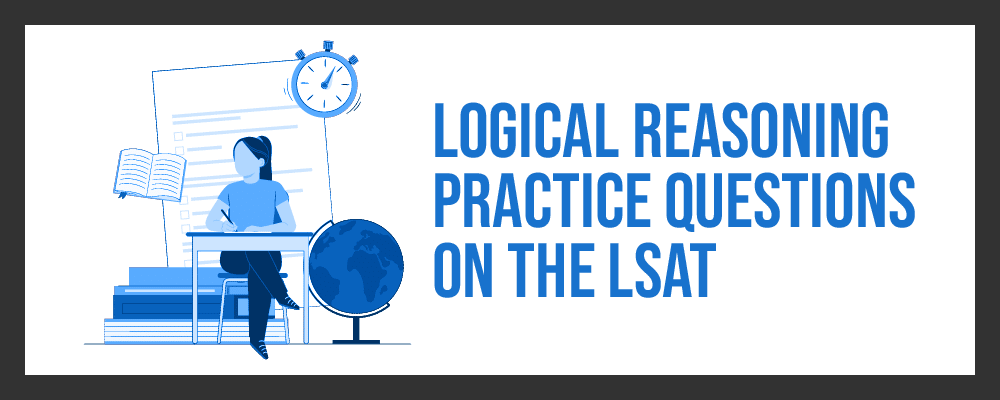
Are you gearing up for the Law School Admission Test (LSAT)? Regardless of your dream law school, the LSAT can be your ally in achieving that goal. Being the sole admission test accepted by all ABA-approved law schools, it plays a crucial role in identifying promising candidates who might otherwise be overlooked due to their undergraduate GPA or other factors.
But what is it made of?

Well, half of your total LSAT score is comprised of logical reasoning sections.
Yes, you heard it right.
According to Kaplan, logical reasoning questions make up half of your total score! For this reason, mastering this section is crucial for acing the exam.
Let’s delve into the details of the logical reasoning sections, the various question types you’ll encounter, practice questions for logical reasoning, and effective strategies to tackle them.
Importance of Logical Reasoning in LSAT
Logical reasoning is a critical aspect of the LSAT, making up two of the four scored sections on the test. These sections test your ability to analyze and evaluate arguments, a crucial skill for future law students and legal professionals.
Understanding Logical Reasoning Questions
In order to master logical reasoning questions on the LSAT, it is important to understand their structure and the types of questions you will face.
Logical Reasoning Question Structure
Each logical reasoning section on the LSAT contains about 25 questions, and you have approximately 35 minutes to complete each section. Each question stems from a brief passage, often an argument or a set of facts, and then asks the test-taker to perform a task related to the passage.
Types of Logical Reasoning Questions
There are several types of logical reasoning questions you may encounter on the LSAT, including argument evaluation, reasoning critique, and inference drawing.
Logical Reasoning Questions LSAT
This section will delve into the different types of logical reasoning questions that can appear in the LSAT, providing examples and techniques to tackle each of them.
Argument Evaluation
These questions require you to evaluate the quality of a given argument. You may be asked to identify the conclusion, determine how well it is supported by the premises, or find any potential weaknesses in the argument.
Specific Question Types:
Assumption Questions: These ask you to identify the unstated premise that the argument relies on to be valid. Finding the missing link is essential since it supports the conclusion.

Strengthen Questions: In these questions, you are required to select an answer choice that fortifies or adds support to the argument’s conclusion, making it more convincing.
Weaken Questions: The goal in weaken questions is to pick an answer choice that undermines or weakens the argument’s conclusion, casting doubt on its validity.
Flaw Questions: These questions prompt you to pinpoint the logical flaw or error within the argument, exposing the reasoning’s weaknesses or faulty assumptions
Logic Games
Also known as “analytical reasoning” questions, these involve a group of statements and rules that together create a scenario. Your job is to make inferences and deductions based on this given information.
Ordering Games: With this LSAT question type, you are required to arrange elements (e.g., people, items, tasks) in a specific order or sequence based on given rules or constraints, determining their positions relative to each other.
Drawing Inferences
These questions require you to draw logical conclusions from the given information. They test your ability to understand and apply principles, recognize logically equivalent statements, and determine what must or might be true given certain facts.
LSAT inference questions break into two types:
- Must-be-true
- Strongly-supported-by
Must-be-true Logical Reasoning
Must-be-true Logical Reasoning (LR) inference questions on the LSAT explicitly ask for conclusions that are unquestionably supported by the given information. For instance, consider the following scenario:
Premise 1: Jennifer always takes the train to work when her car is in the shop. Premise 2: Jennifer’s car is currently in the shop for repairs. Premise 3: The train service is operating normally today.
In this situation, what must be true (although not explicitly stated) is that Jennifer will take the train to work today.
It is essential to recognize that must-be-true LR questions demand conclusions that are undoubtedly supported by the information provided. In the example above, the certainty arises from Jennifer’s consistent behavior when her car is unavailable, combined with the operational status of the train service. Although other possibilities might exist, the given premises make it a definite inference that Jennifer will take the train to work today.
Strongly-supported-by Logical Reasoning
Strongly-supported LR Inference questions on the LSAT function slightly differently, utilizing question stems that include phrases like “follows logically” or “strongly supported by.” For instance, consider the following scenario:
Premise 1: Amy always chooses action-packed movies because they remind her of her adventurous experiences during a summer trip.
Premise 2: Amy has never seen a sci-fi movie, but she knows that they often feature thrilling space adventures.
The strongly supported inference here is that Amy may enjoy sci-fi movies due to their potential to provide action-packed and thrilling space adventures similar to what she likes. However, it’s crucial to note that this is not a “must-be-true” scenario. It is plausible that Amy might have a particular aversion to sci-fi movies for personal reasons unrelated to their genre characteristics.
In strongly-supported inference questions, the correct answer choice will be the deduction or inference that is most compellingly supported by the stimulus statements. In the example above, the inference that Amy might enjoy sci-fi movies aligns with her preference for action-packed adventures, despite her lack of experience with the genre.
Strategies for Tackling Logical Reasoning Questions
Mastering logical reasoning questions on the LSAT requires a strategic approach. Here are some effective strategies to consider.
Identifying the Argument Structure
Understanding the structure of the argument in the question can help you better evaluate its logic. Look for the conclusion and the premises supporting it.
Anticipating the Correct Answer
Before looking at the answer choices, try to anticipate what the correct answer might be. This approach can help you avoid being tricked by incorrect choices that might seem plausible at first glance.
Elimination of Wrong Choices
Sometimes, it’s easier to eliminate incorrect answers than to find the correct one. If you can eliminate even one or two options, you’ll significantly increase your chances of choosing the correct answer.
Practice Makes Perfect: LSAT Logical Reasoning Sample Questions
The best way to get comfortable with logical reasoning questions and refine your strategies is through practice. Let’s look at some practice questions.
Practice Question Set 1: Argument Evaluation Sample Questions
- A computer science company claims that their latest software update is the best in the industry. Their reasoning is based on the claim that no other competing product has the same speed and efficiency. Which of the following, if true, would most weaken the company’s argument?
- a) Another company has developed software with similar speed but more features.
- b) The company’s software was rated highly in consumer reports last year.
- c) The company’s previous software updates have been well received.
- d) The speed of software isn’t the most critical factor for all consumers.
Correct answer: a
- A recent health study concluded that people who drink at least 8 glasses of water per day are less likely to develop skin diseases. This study, therefore, suggests that sufficient water intake can prevent skin diseases. What assumption is the study based upon?
- a) All skin diseases are influenced by hydration levels.
- b) Those who drink fewer than 8 glasses of water will develop skin diseases.
- c) People who drink 8 glasses of water lead a healthier lifestyle.
- d) Drinking more than 8 glasses of water can further reduce the likelihood of skin diseases.
Correct answer: a
- “If a person is a musician, they have an artistic temperament. Sarah is a musician. Therefore, Sarah has an artistic temperament.” The above argument employs which form of reasoning?
- a) Hypothetical reasoning
- b) Deductive reasoning
- c) Inductive reasoning
- d) Abductive reasoning
Correct answer: b
- “Despite increasing the police force in our city, the crime rate has not decreased. Thus, increasing the police force does not lead to a reduction in crime.” This argument fails to consider which of the following?
- a) The time it takes for the impact of an increased police force to reflect in the crime rate.
- b) Other potential factors that might have led to the increased crime rate.
- c) The possibility that crime would have increased even more without an increased police force.
- d) All of the above.
Correct answer: d
- “All dogs are animals. All animals breathe. Therefore, all dogs breathe.” This argument is an example of:
- a) A syllogism
- b) A paradox
- c) A fallacy
- d) A hypothesis
Correct answer: a
- “If a nation wishes to prevent a fiscal deficit, it must reduce its spending or increase its revenue. The nation of Econosia does not wish to prevent a fiscal deficit. Thus, Econosia does not need to reduce its spending or increase its revenue.” This argument is an example of:
- a) Circular reasoning
- b) Denying the antecedent
- c) Ad hominem
- d) Red herring
Correct answer: b
- “The ocean is a large body of water, and large bodies of water are habitats for various species. Thus, the ocean is a habitat for various species.” This argument represents which logical reasoning technique?
- a) Reductio ad absurdum
- b) Straw man argument
- c) Post hoc ergo propter hoc
- d) Valid syllogism
Correct answer: d
- A politician claims that their new policy will result in economic growth for everyone. The reasoning behind this is that the policy has worked in other similar countries. What would most weaken this argument?
- a) A poll shows that the public supports the policy.
- b) The policy has never been tried in this country before.
- c) Economic experts argue that the policy is sound in theory.
- d) The countries where the policy worked had different economic conditions.
Correct answer: d
- An environmental activist argues that to reduce the effects of climate change, we must reduce our dependence on fossil fuels. Which of the following, if true, would most strengthen this argument?
- a) Fossil fuels are a significant source of greenhouse gases.
- b) Some people don’t believe in climate change.
- c) Fossil fuels are expected to run out in the next century.
- d) Renewable energy technology is improving.
Correct answer: a
- “All athletes must be fit. John is fit. Therefore, John is an athlete.” This argument commits which logical fallacy?
- a) False dichotomy
- b) Affirming the consequent
- c) Slippery slope
- d) Ad hominem
Correct answer: b
Practice Question Set 2: Logic Games
- Five friends — Albert, Ben, Carla, David, and Eva — are sitting in a row of chairs. Albert can’t sit next to Carla, and David must sit to the right of Ben. If Eva sits in the middle, which of the following must be true?
- a) Albert sits on the far left.
- b) Ben sits on the far right.
- c) Carla sits next to David.
- d) David sits next to Eva.
Correct answer: d
- In a race, Adam is faster than Bruce but slower than Carl. If Daniel is slower than Adam but faster than Bruce, who is the slowest runner?
- a) Adam
- b) Bruce
- c) Carl
- d) Daniel
Correct answer: b
- Four friends are selecting a movie to watch. They can choose from Action, Comedy, Drama, and Sci-fi. If Alex hates Action and Betty dislikes Drama, and they agree to choose a genre nobody hates, what genres are they left with?
- a) Comedy and Sci-fi
- b) Action and Comedy
- c) Drama and Sci-fi
- d) Action and Drama
Correct answer: a
- In a school art competition, there are four prize places: 1st, 2nd, 3rd, and a consolation prize. If John doesn’t win 1st but gets a prize, and Laura beats John but doesn’t come 1st, which positions could John and Laura have come in?
- a) John 2nd, Laura 3rd
- b) John 3rd, Laura 2nd
- c) John consolation, Laura 3rd
- d) Both b and c
Correct answer: d
- Five friends are standing in line at a movie theater. Tom can’t stand next to Jerry, and Alice must stand to the right of Bob. If Jerry stands in the middle, which of the following must be true?
- a) Tom stands on the far left.
- b) Bob stands on the far right.
- c) Alice stands next to Jerry.
- d) Bob stands next to Jerry.
Correct answer: a
- In a relay race, Peter is faster than Jack but slower than Mike. If Tom is slower than Peter but faster than Jack, who is the slowest runner?
- a) Peter
- b) Jack
- c) Mike
- d) Tom
Correct answer: b
- Four friends are selecting a book to read. They can choose from Mystery, Romance, Fantasy, and Biography. If Mary dislikes Mystery and John dislikes Fantasy, and they agree to choose a genre nobody dislikes, what genres are they left with?
- a) Romance and Biography
- b) Mystery and Romance
- c) Fantasy and Biography
- d) Mystery and Fantasy
Correct answer: a
- In a math competition, there are four prize places: 1st, 2nd, 3rd, and a consolation prize. If David doesn’t win 1st but gets a prize, and Sam beats David but doesn’t come 1st, which positions could David and Sam have come in?
- a) David 2nd, Sam 3rd
- b) David 3rd, Sam 2nd
- c) David consolation, Sam 3rd
- d) Both b and c
Correct answer: d
- Five friends are sitting in a row of chairs at a concert. Robin can’t sit next to Lilly, and Barney must sit to the right of Ted. If Lilly sits in the middle, which of the following must be true?
- a) Robin sits on the far left.
- b) Ted sits on the far right.
- c) Barney sits next to Lilly.
- d) Ted sits next to Lilly.
Correct answer: c
- In a swimming competition, Chris is faster than Steve but slower than Robert. If Max is slower than Chris but faster than Steve, who is the slowest swimmer?
- a) Chris
- b) Steve
- c) Robert
- d) Max
Correct answer: b
Practice Question Set 3: Drawing Inferences
- Anne is older than both Bea and Cindy. Bea is older than Cindy. If the above statements are true, which of the following must also be true?
- a) Cindy is the youngest.
- b) Bea is the oldest.
- c) Anne is younger than Cindy.
- d) Cindy is older than Anne.
Correct answer: a
- All members of the gardening club have green thumbs. Marissa does not have a green thumb. Based on these statements, what can be inferred?
- a) Marissa is a member of the gardening club.
- b) Marissa is not a member of the gardening club.
- c) Some members of the gardening club do not have green thumbs.
- d) None of the above.
Correct answer: b
- None of the cats in the house are black. All the pets in the house are cats. What can you infer from the given statements?
- a) Some of the pets in the house are black.
- b) There are no black pets in the house.
- c) There are black cats in the house.
- d) There are pets other than cats in the house.
Correct answer: b
- All cars in the parking lot are red. Some cars in the parking lot are convertibles. Based on these statements, what can be inferred?
- a) All cars in the parking lot are red convertibles.
- b) Some cars in the parking lot are red convertibles.
- c) No cars in the parking lot are red convertibles.
- d) None of the above.
Correct answer: b
- John goes to the gym whenever he has time. John has time today. What can you infer from the given statements?
- a) John does not go to the gym today.
- b) John goes to the gym today.
- c) John never goes to the gym.
- d) John always has time.
Correct answer: b
- All pianists have nimble fingers. Jenny has nimble fingers. Based on these statements, what can be inferred?
- a) Jenny is a pianist.
- b) Jenny is not a pianist.
- c) All people with nimble fingers are pianists.
- d) None of the above.
Correct answer: d
- No professional athletes are lazy. Some lazy people are wealthy. What can you infer from the given statements?
- a) Some professional athletes are wealthy.
- b) No professional athletes are wealthy.
- c) Some wealthy people are not professional athletes.
- d) None of the above.
Correct answer: c
- Every bird in the park is a duck. All ducks have feathers. Based on these statements, what can be inferred?
- a) All birds in the park have feathers.
- b) Some birds in the park do not have feathers.
- c) All birds with feathers are in the park.
- d) Some ducks in the park do not have feathers.
Correct answer: a
- All computer scientists love mathematics. George does not love mathematics. What can you infer from the given statements?
- a) George is a computer scientist.
- b) George is not a computer scientist.
- c) Some computer scientists do not love mathematics.
- d) All people who love mathematics are computer scientists.
Correct answer: b
- Every apple in the basket is green. Some green things are emeralds. Based on these statements, what can be inferred?
- a) Some apples in the basket are emeralds.
- b) No apples in the basket are emeralds.
- c) All emeralds in the basket are apples.
- d) None of the above.
Correct answer: b
Answering Logical Reasoning Questions: Expert Tips
Here are some expert tips for mastering logical reasoning questions on the LSAT.
Reviewing and Understanding Mistakes
Review each practice question you get wrong and understand why you got it wrong. This is a powerful way to improve your logical reasoning skills and avoid making the same mistakes in the future.
Importance of Time Management
The LSAT is a timed test, and managing your time effectively is crucial. Practice under timed conditions to get a feel for the pacing of the test.
Staying Calm and Focused
It’s normal to feel nervous, but maintaining a calm, focused mindset can significantly improve your performance on the LSAT.
Conclusion
The logical reasoning sections of the LSAT are undeniably significant, making up half of your total score. A high level of proficiency in this area can significantly boost your overall LSAT score and, in turn, your prospects of gaining admission into your chosen law school.
As Manhattan Prep noted, improving just three questions in the logical reasoning sections could raise your LSAT score by two points. This reinforces the importance of rigorous practice, in-depth understanding, and strategic preparation.
Start your preparation today and step confidently towards achieving your law school aspirations.
Frequently Asked Questions
The Law School Admission Test (LSAT) is a standardized test used as part of the law school admissions process. It measures skills such as reading comprehension, logical, and verbal reasoning, which are crucial for success in law school.
Logical reasoning questions stem from a brief passage, usually an argument or set of facts. Each logical reasoning section contains about 25 questions, with about 35 minutes to complete each section.
The LSAT features several types of logical reasoning questions, including argument evaluation, reasoning critique, and inference drawing.
Effective strategies include identifying the argument structure, anticipating the correct answer, and eliminating incorrect choices.
To prepare for the LSAT’s logical reasoning sections, learn and apply test-taking strategies, engage in abundant practice, and review your mistakes. Additionally, consider utilizing resources from the top LSAT prep courses to optimize your preparation. Timed practice can further enhance your performance by improving speed and accuracy.
The best LSAT tutors enhance LSAT preparation by providing personalized strategies, explaining complex concepts, and giving immediate feedback, ultimately guiding you toward your target LSAT score.

Bryce Welker is an unstoppable force in the worlds of business and education. He’s a dynamic speaker, expert blogger, and a regular contributor to top-tier publications like Forbes, Inc.com, Business.com, and AccountingToday.com. With a proven track record of founding over 20 innovative test prep websites, Bryce has helped countless students and professionals pass their certification exams and achieve their dreams. Whether you’re seeking career advancement or educational success, Bryce Welker is the ultimate guide to help you get there.




